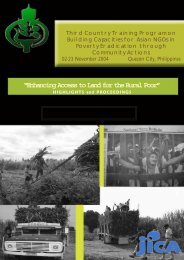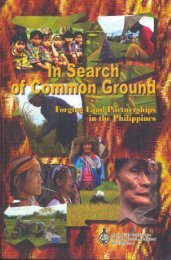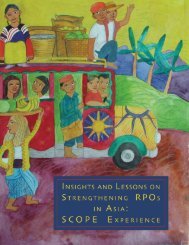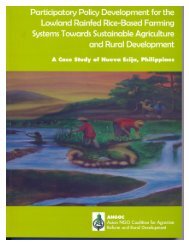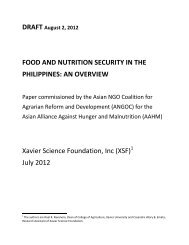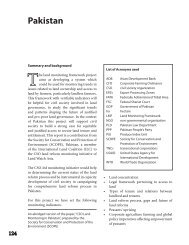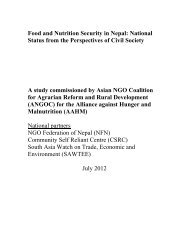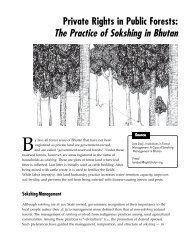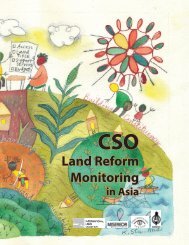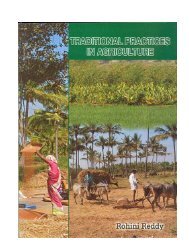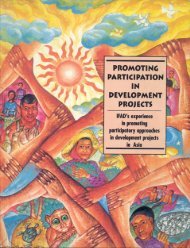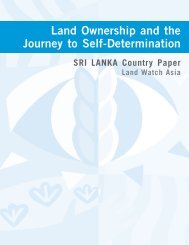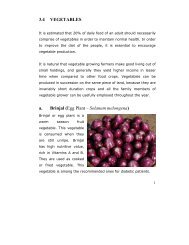Securing the Right to Land FULL - ANGOC
Securing the Right to Land FULL - ANGOC
Securing the Right to Land FULL - ANGOC
You also want an ePaper? Increase the reach of your titles
YUMPU automatically turns print PDFs into web optimized ePapers that Google loves.
Table 3. con’t.<br />
India<br />
Indonesia<br />
Nepal<br />
Philippines<br />
Highlighted Issues<br />
THE PROLONGED STRUGGLE FOR LAND RIGHTS IN ASIA<br />
25<br />
whom are landless or own very small landholdings, because it pushes farmers and peasants from <strong>the</strong> land.<br />
The increasing cultivation of biofuels on scarce agricultural land is ano<strong>the</strong>r threat <strong>to</strong> food security.<br />
Expansion of plantations.<br />
Since Indonesian independence, <strong>the</strong> control of plantation areas has passed back and forth from <strong>the</strong><br />
Dutch colonizers <strong>to</strong> peasants. In 2003, President Wahid declared that some plantation companies were<br />
guilty of grabbing land from peasants and demanded <strong>the</strong> return of lands <strong>to</strong> <strong>the</strong>ir former owners as well<br />
as restructuring of companies. Unfortunately, his reforms never materialized due <strong>to</strong> formidable opposition<br />
from plantation owners. The “partnership model” promoted by <strong>the</strong> government is contract farming,<br />
intended <strong>to</strong> defuse tension between plantation companies and peasants. However, <strong>the</strong> model has benefitted<br />
only plantation owners and foreign inves<strong>to</strong>rs; <strong>the</strong> conditions of <strong>the</strong> poor have barely improved.<br />
Indiscriminate awarding of forest and timber concessions.<br />
The rapid rate of deforestation in Indonesia is largely attributed <strong>to</strong> exploitative practices of forest<br />
and timber concessionaires. By virtue of <strong>the</strong> Basic Forestry Law (Law No. 5) of 1967 and Government<br />
Regulation No. 21 of 1970, large-scale investments in <strong>the</strong> forestry sec<strong>to</strong>r have been facilitated and all<br />
commercial forestry has become <strong>the</strong> preserve of private inves<strong>to</strong>rs holding forest concessions. Communities<br />
living in or around forest areas are prohibited from logging within concession areas, and can<br />
do so only if <strong>the</strong>y have a permit from <strong>the</strong> concessionaire. Conflicts have erupted between communities<br />
and forest concession holders.<br />
Mining on indigenous people’s lands.<br />
Article 33 of <strong>the</strong> 1945 Indonesian Constitution grants <strong>the</strong> State exclusive rights <strong>to</strong> <strong>the</strong> country’s<br />
mineral resources. Law No. 11 of 19687 or <strong>the</strong> Law on Mining provides that all mineral deposits are<br />
State-controlled assets. These two laws have given <strong>the</strong> State blanket authority <strong>to</strong> conduct its own<br />
mining operations or grant mining concessions. Such mining operations encroach on IP lands and<br />
have had injurious effects on IP communities.<br />
Centralized land governance.<br />
Decisions related <strong>to</strong> land management are made at Ministry level. In effect, people in remote areas<br />
ei<strong>the</strong>r have <strong>to</strong> bring <strong>the</strong>ir case all <strong>the</strong> way <strong>to</strong> Kathmandu, or wait for <strong>the</strong> Ministry’s decision <strong>to</strong> be<br />
handed down <strong>to</strong> district offices. However, local government agencies usually do not have authority <strong>to</strong><br />
settle issues and are frequently biased against <strong>the</strong> poor. <strong>Land</strong> administration is procedurally complex<br />
and poor people cannot deal with <strong>the</strong> formalities it requires.<br />
Abolition of collective rights.<br />
Indigenous and ethnic groups are rapidly being displaced from <strong>the</strong>ir land, as a result of state-supported<br />
lucrative activities such as oil exploitation, mining, construction of dams, logging, cash crop<br />
cultivation, cattle ranches, and development of <strong>to</strong>urism infrastructure.<br />
Expiration of CARP funding.<br />
Funding for CARP expired in June 2008. <strong>Land</strong> acquisition and distribution remain unfinished. By<br />
next year 1.1 million hectares of private agricultural lands still need <strong>to</strong> be covered. Support service<br />
delivery has been insufficient, due <strong>to</strong> limited funding. Quality support services have only reached a<br />
quarter of <strong>the</strong> two million agrarian reform (AR) beneficiaries.<br />
ASIAN NGO COALITION FOR AGRARIAN REFORM AND RURAL DEVELOPMENT



